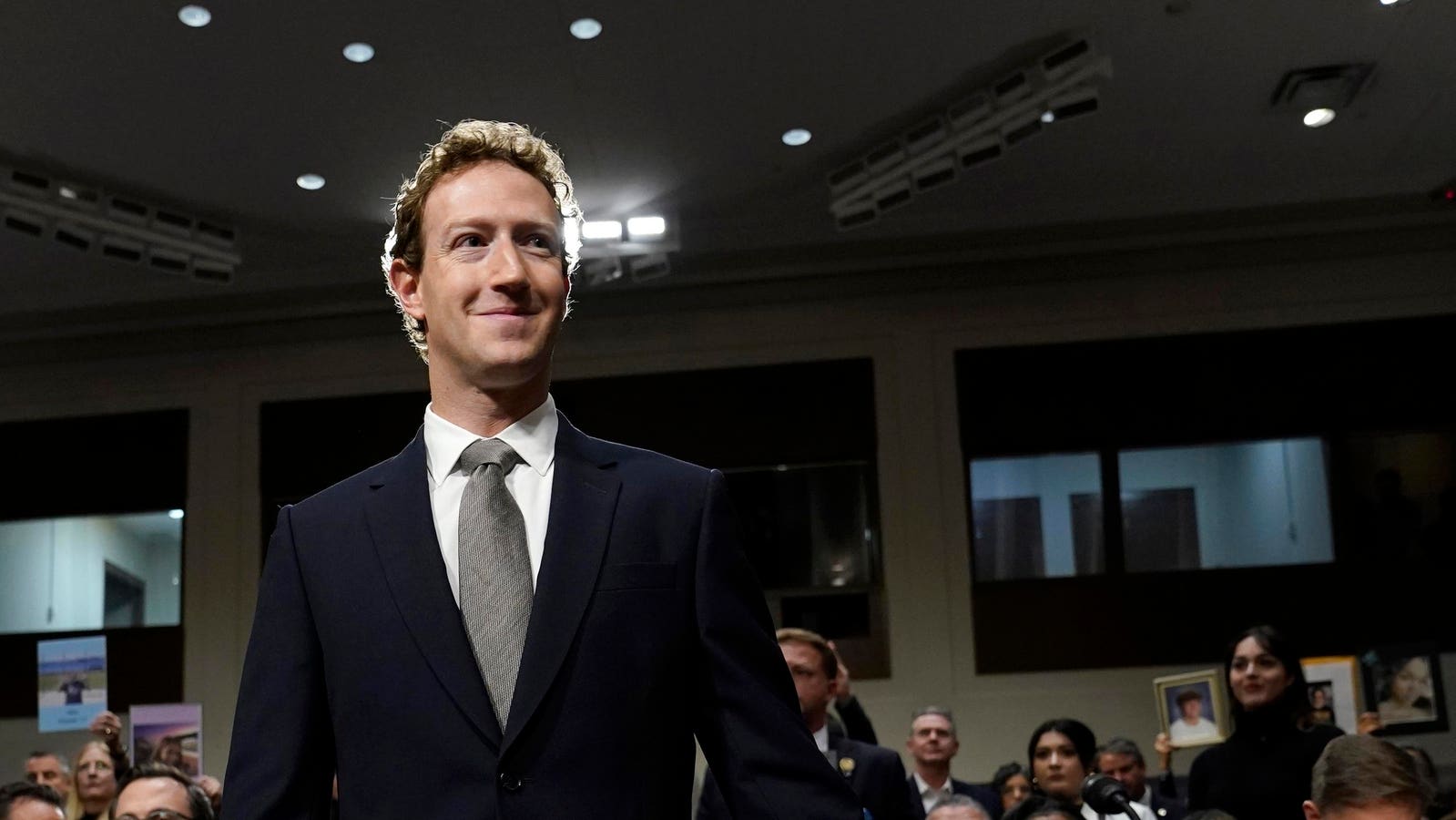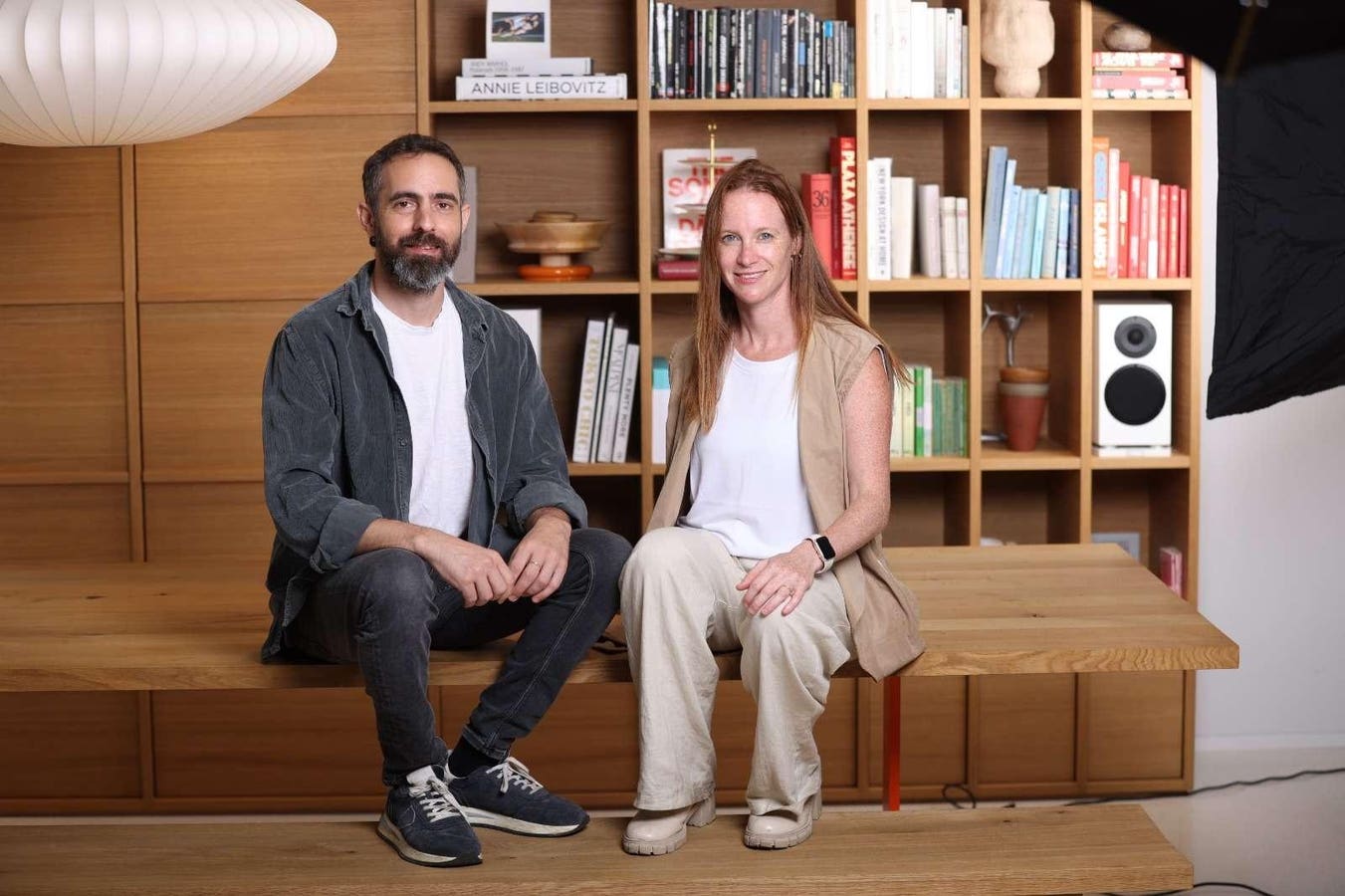Topline
Meta CEO Mark Zuckerberg, former COO Sheryl Sandberg and other billionaires tied to Facebook will go on trial in Delaware on Wednesday, as a week-long trial determines whether the company’s past and present leadership will be forced to pay $8 billion in damages for knowingly violating a privacy agreement, which led to the Cambridge Analytica scandal.
Meta CEO Mark Zuckerberg arrives to testify before a Senate Judiciary Committee hearing on Capitol … More
Key Facts
Facebook shareholders sued the company’s leadership in 2018, alleging they knowingly violated an agreement with the Federal Trade Commission by sharing data about users’ friends with third-party apps without those friends’ knowledge.
Facebook, which rebranded to Meta in 2021, signed a consent order with the FTC in 2012, in which the company agreed to create a “comprehensive privacy program” to address privacy concerns arising from its products.
The FTC prohibited Facebook from misrepresenting how it maintains and shares “covered information” about its users—such as their names, addresses, emails, or physical locations—and what controls users have over the privacy of that information.
Zuckerberg, Sandberg and other Facebook leadership knowingly didn’t comply with that agreement, the plaintiffs allege, as they still allowed third-party apps to collect app users’ data about their friends and those friends’ personal information, even if the friends didn’t consent to using the app themselves.
That issue came to light with the Cambridge Analytica scandal, in which millions of users’ Facebook data was harvested through a third-party app, and that data was allegedly used to influence major political events such as Brexit and the 2016 election.
The plaintiffs also allege Facebook entered into agreements with specific companies that granted them access to users’ friend data, even after Zuckerberg said Facebook was making that data sharing more secure—making those agreements with companies run by venture capitalists Marc Andreessen and Peter Thiel and Netflix CEO Reed Hastings, who all also served on Facebook’s board.
How Long Will The Trial Last—and Who Will Testify?
The trial begins Wednesday in Delaware Chancery Court—as Meta is incorporated in the state—and will last for eight days. There’s no jury in the trial and the judge will issue the verdict in the case. That will likely come out in the weeks or months following the trial, rather than when the trial wraps up. Zuckerberg, Sandberg, Thiel, Andreessen and Hastings are all expected to testify, according to Reuters.
Who Are The Key Players Being Sued?
Defendants in the lawsuit include Zuckerberg, Sandberg and former Facebook Partnerships VP Konstantinos Papamiltiadis, whom the lawsuit alleges knowingly made deals with third-party apps that violated the 2012 FTC agreement. The lawsuit also names Andreessen, Thiel and Hastings, who were board members at the time and allegedly knew about the non-compliance with the FTC consent order, given their companies were given favorable agreements that allegedly violated it. Other Facebook board members named in the complaint are former Bill & Melinda Gates Foundation CEO Dr. Susan Desmond-Hellman, eBay CFO Peggy Alford and former American Express CEO Kenneth Chenault. The lawsuit additionally names two former White House chiefs of staff as defendants based on their roles on Facebook’s board: Erskine Bowles, who served during Bill Clinton’s presidency, and former chief of staff to President Joe Biden, Jeff Zients, who served on the board prior to his role at the White House.
Big Number
$8 billion. That’s how much the shareholders are asking for the defendants to pay in damages, which they said reflects the amount Facebook had to pay in costs as a result of the leaders’ allegedly unlawful activities.
What Else Does The Lawsuit Allege?
The shareholders bringing the suit make a number of allegations suggesting the defendants in the case knew that they were not in compliance with their privacy obligations. Facebook allegedly moved a notice to users that their privacy could be shared with third-party apps to be more noticeable after reaching the consent order with the FTC, for instance, only to then move it back to the less-prominent place it was in before the order, allegedly with Zuckerberg’s knowledge. Facebook’s privacy head Yul Kwon also allegedly warned Zuckerberg and Sandberg in 2015 that the company was not doing enough to address privacy concerns, warning Facebook’s “privacy program was disorganized and under-resourced” and the company hadn’t properly “prioritized” privacy concerns, which was causing a “colossal problem.” Zuckerberg and Sandberg allegedly didn’t implement Kwon’s suggestions for the improving privacy infrastructure until after Cambridge Analytica, however, and Kwon testified the company may have avoided that scandal had they heeded his advice. The plaintiffs also take issue with Facebook’s board of directors approving a $5 billion settlement with the FTC in 2019, arguing they paid a higher-than-required rate in order to protect Zuckerberg and shield him from legal liability. The lawsuit separately details Zuckerberg selling approximately $5 billion in Facebook stock in 2018, which the plaintiffs allege he did because he knew about the company’s non-compliance with its privacy obligations.
What Do The Defendants Argue?
The defendants strongly deny any claims of wrongdoing, alleging in a court filing the plaintiffs do not have any evidence to back up their claims of officials acting unlawfully and, “To the contrary, the evidence will show that under the board’s leadership, Facebook worked effectively to comply with the 2012 order.” “The evidence will show that Facebook implemented a robust system of privacy controls” and consistently updated the FTC on its efforts, the defendants argued, claiming the evidence in the case “negates plaintiffs’ pleaded portrait of a company indifferent to compliance.” The defendants also allege their deals with specific companies allowing them to access more data did not violate the 2012 FTC order and that Zuckerberg’s sale of his stocks was in compliance with the law and was done in order to fund his charitable pursuits. They also deny the Cambridge Analytica scandal reflects any wrongdoing on Facebook or its officials’ part, alleging that while the scandal was “decidedly a traumatic event” for the company, “it was the product of Cambridge Analytica’s studied deceit—not remotely the product of the bad faith inattention of Facebook’s fiduciaries.”
Forbes Valuation
Forbes estimates Zuckerberg’s net worth at $242.3 billion as of Wednesday afternoon, making him the third-richest person in the world. Many of the defendants named in the lawsuit are among the richest people in the world, including Sandberg (valued at $2.4 billion as of Wednesday), Andreessen ($2 billion), Thiel ($22.7 billion) and Hastings ($6.8 billion).
Surprising Fact
Sandberg has already been punished as part of the lawsuit, as the ex-Facebook COO was sanctioned by the court in January for allegedly deleting personal emails that were material to the lawsuit. That could make it more difficult for her to prove her innocence at trial, Reuters noted, and information about the emails will not be used at trial. The former exec alleged she rarely used her personal email and that other users were copied on any now-deleted messages, so that the information was preserved.
What Is The Cambridge Analytica Scandal?
Cambridge Analytica was a voter-profiling company that obtained data from Facebook users through Cambridge University professor Dr. Aleksandr Kogan, who created a quiz on Facebook that was used to harvest data about users who opted into it and, by extension, their friends. That data was then shared with Cambridge Analytica, and The New York Times and The Intercept reported the firm used that data and other records to create “psychographic profiles” for approximately 30 million people—despite only some 270,000 actually opting into using Kogan’s app. Cambridge Analytica, which had ties to Trump adviser Steve Bannon, then used that data to work on various political campaigns in the ensuing years, including Brexit, the 2014 U.S. midterms and the 2016 presidential election, in which President Donald Trump’s campaign and Sen. Ted Cruz, R-Texas, worked with the firm, according to the Times. The news of Cambridge Analytica’s use of such vast Facebook data was first reported by The Guardian in 2015, which alleged Cruz was using the data. Further reports by The Guardian and The New York Times in 2018 then detailed the wider scope of the firm’s work, thanks to a whistleblower exposing the firm. Those reports set off a series of investigations and legal actions, including the shareholder lawsuit. Facebook and Zuckerberg apologized for their role in the scandal after it came to light and imposed new privacy controls, and Zuckerberg testified to Congress, admitting the company “didn’t do enough to prevent these tools from being used for harm” and saying about the data breach, “It was my mistake, and I’m sorry. I started Facebook, I run it, and I’m responsible for what happens here.” Cambridge Analytica filed for bankruptcy in 2018, and in addition to the $5 billion fine from the FTC, Facebook has also faced consequences for the scandal including paying a $100 million fine from the Securities and Exchange Commission, a $725 million legal settlement and a £500,000 (approximately $645,000) fine from the U.K. Information Commissioner’s Office.
Further Reading
Meta ex-COO Sandberg sanctioned in investor lawsuit for deleting emails (Reuters)
Meta Trial Over Cambridge Analytica Scandal Tests Chancery Court (Bloomberg)
As Facebook Raised a Privacy Wall, It Carved an Opening for Tech Giants (New York Times)








